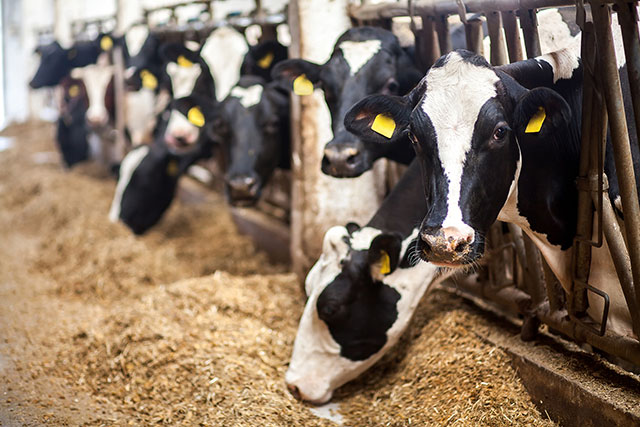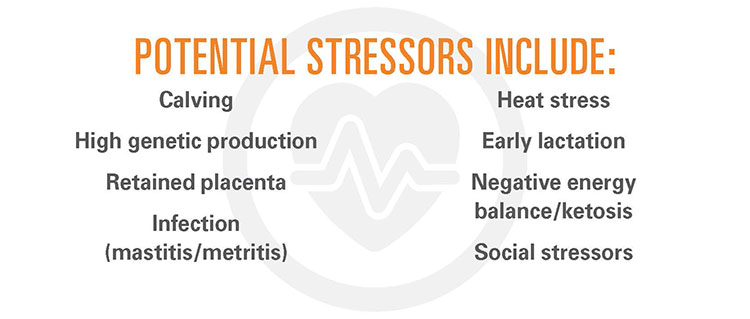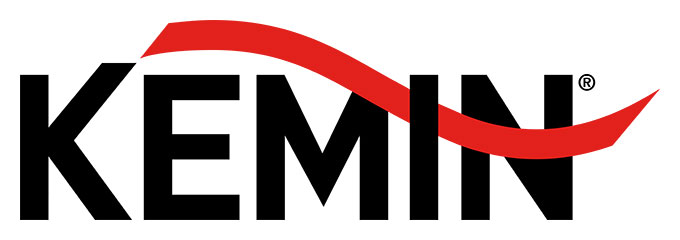
Most dairy producers understand that healthy, efficient cows generate the greatest returns. With feed attributing to nearly 70% of total production costs, constant effort and creativity are required to achieve optimal return on investment. A variety of strategies and products exist to prevent disease, improve production and maintain overall health in dairy cattle. However, one of the more under-used strategies is the inclusion of chromium in the diet.
Chromium as an essential nutrient
The essential trace mineral chromium has the unique ability to bind to insulin receptors and allow glucose into cells. In cattle, chromium supplementation has increased insulin, altered immune responses and reduced cortisol levels. University studies with chromium have also shown that it decreases subclinical metritis, reduces days to first service, improves conception rates and increases pregnancy rates.
Typical stressors in the life of a dairy cow

The stress response
Stress can be defined as any stimulus, such as heat, fear or pain, that disturbs or interferes with the normal physiological equilibrium of an animal. In response to stress, glucocorticoids (primarily cortisol) and catecholamines (adrenaline and noradrenaline) alter carbohydrate and protein metabolism, growth, reproduction and immune function. Activation of the immune system leads to inefficient feed use due to consumption of nutrients by the immune system. Despite the increase in nutrients required by the immune system, activation of the immune system also leads to a decrease in feed intake, which further exacerbates the problem. Upon the initiation of a stress response, an energetically demanding immune response may be stimulated.
If stress becomes chronic (which often occurs during transition due to management factors such as pen movements, mixing of heifers into mature cow groups, adjustment to new rations and new routines, etc.), there will be a continual release of cortisol, in addition to health challenges. This is not desirable because it diverts nutrients away from productive functions, such as milk production and reproduction.
How chromium supplementation improves insulin sensitivity
Improved insulin sensitivity helps minimize the negative effects of stress on overall productivity. Chromium comes into play in two ways: first, it has been shown to decrease serum cortisol during stressful periods, and second, it improves insulin sensitivity due to its unique ability to bind to insulin receptors and facilitate the uptake of glucose into cells.
Chromium effects on cow responses
Researchers report that chromium can enhance milk yield, reproduction, immune response and/or heat stress response compared to cows not supplemented with chromium. Kemin recently conducted a thorough meta-analysis of 16 peer-reviewed scientific journal articles that evaluate the impact of chromium supplementation in dairy cattle. The findings not only confirm the benefits of chromium, but also provide a comprehensive statistical analysis of the advantages in production and profitability that dairy producers stand to gain.
Table 1. Summary of meta-analysis

Further analysis indicates the likelihood of achieving results on your operation:
- 98.5% probability that DMI will increase by 1 lb/h/d
- 99.9% probability that milk yield will increase by 1 lb/h/d
- 96.9% probability that milk yield will increase by 2 lb/h/d
- 70.9% probability that milk yield will increase by 3 lb/h/d
Understanding the relationship between stress, immunity and reproductive herd health is paramount to discovering best nutritional management practices for your dairy herd. Chromium supplementation primarily acts to improve insulin sensitivity and reduce the release of stress hormones, both of which can enhance performance. Dairy farmers, nutritionists and veterinarians should consider adding chromium to their trace mineral program for higher dry matter intake (DMI) and milk production, improved health and immunity and potential reproduction improvement.
Schedule a personal review of the study, Effects of additional bioavailable chromium on dry matter intake, milk yield, and component production: a meta-analysis by contacting KeminAg@kemin.com or visit kemin.com/chromium to learn more about chromium.
